|
mutLBSgeneDB |
| |
| |
| |
| |
| |
| |
|
| Gene summary for LIG3 |
 Gene summary Gene summary |
| Basic gene Info. | Gene symbol | LIG3 |
| Gene name | ligase III, DNA, ATP-dependent | |
| Synonyms | LIG2 | |
| Cytomap | UCSC genome browser: 17q11.2-q12 | |
| Type of gene | protein-coding | |
| RefGenes | NM_002311.4, NM_013975.3, | |
| Description | DNA ligase 3ligase II, DNA, ATP-dependentpolydeoxyribonucleotide synthase [ATP] 3 | |
| Modification date | 20141207 | |
| dbXrefs | MIM : 600940 | |
| HGNC : HGNC | ||
| Ensembl : ENSG00000005156 | ||
| HPRD : 02966 | ||
| Vega : OTTHUMG00000128519 | ||
| Protein | UniProt: P49916 go to UniProt's Cross Reference DB Table | |
| Expression | CleanEX: HS_LIG3 | |
| BioGPS: 3980 | ||
| Pathway | NCI Pathway Interaction Database: LIG3 | |
| KEGG: LIG3 | ||
| REACTOME: LIG3 | ||
| Pathway Commons: LIG3 | ||
| Context | iHOP: LIG3 | |
| ligand binding site mutation search in PubMed: LIG3 | ||
| UCL Cancer Institute: LIG3 | ||
| Assigned class in mutLBSgeneDB | C: This gene just belongs to mutLBSgenes. | |
 Gene ontology having evidence of Inferred from Direct Assay (IDA) from Entrez Gene ontology having evidence of Inferred from Direct Assay (IDA) from Entrez |
| GO ID | GO Term | PubMed ID | GO:0033151 | V(D)J recombination | 9809069 |
| Top |
| Ligand binding site mutations for LIG3 |
 Cancer type specific mutLBS sorted by frequency Cancer type specific mutLBS sorted by frequency |
| LBS | AAchange of nsSNV | Cancer type | # samples | N322,N320 | L321F | BLCA | 1 | H733 | H733Y | LUAD | 1 | F595 | D596H | LUAD | 1 | G732,A730 | G731E | LUSC | 1 | I710 | I710V | OV | 1 | H795 | T796K | OV | 1 | K704 | G706S | SKCM | 1 | G700 | Y699C | STAD | 1 | K531 | V533I | STAD | 1 | C108 | K107T | STAD | 1 | G425 | A426V | STAD | 1 |
| cf) Cancer type abbreviation. BLCA: Bladder urothelial carcinoma, BRCA: Breast invasive carcinoma, CESC: Cervical squamous cell carcinoma and endocervical adenocarcinoma, COAD: Colon adenocarcinoma, GBM: Glioblastoma multiforme, LGG: Brain lower grade glioma, HNSC: Head and neck squamous cell carcinoma, KICH: Kidney chromophobe, KIRC: Kidney renal clear cell carcinoma, KIRP: Kidney renal papillary cell carcinoma, LAML: Acute myeloid leukemia, LUAD: Lung adenocarcinoma, LUSC: Lung squamous cell carcinoma, OV: Ovarian serous cystadenocarcinoma, PAAD: Pancreatic adenocarcinoma, PRAD: Prostate adenocarcinoma, SKCM: Skin cutaneous melanoma, STAD: Stomach adenocarcinoma, THCA: Thyroid carcinoma, UCEC: Uterine corpus endometrial carcinoma. |
| Top |
| Protein structure related information for LIG3 |
 Relative protein structure stability change (ΔΔE) using Mupro 1.1 Relative protein structure stability change (ΔΔE) using Mupro 1.1 Mupro score denotes assessment of the effect of mutations on thermodynamic stability. (ΔΔE<0: mutation decreases stability, ΔΔE>0: mutation increases stability) |
 : nsSNV at non-LBS : nsSNV at non-LBS : nsSNV at LBS : nsSNV at LBS |
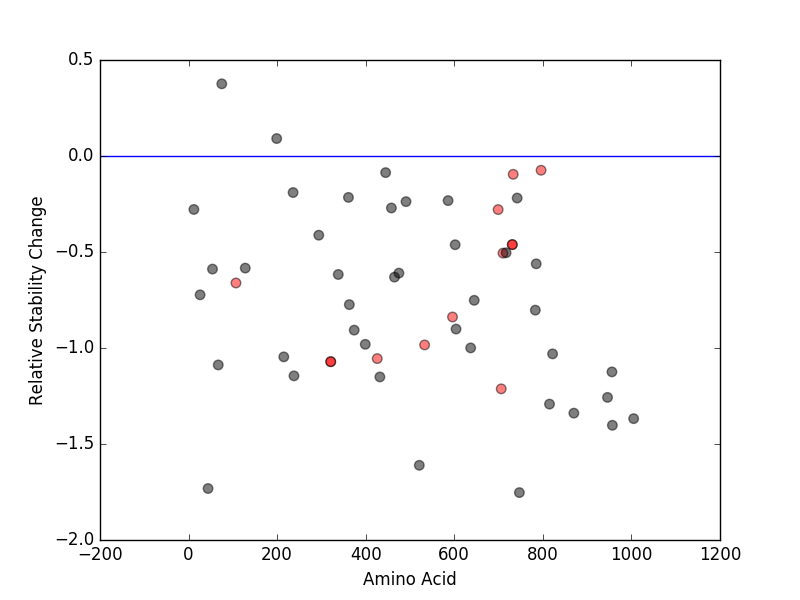 |
 nsSNVs sorted by the relative stability change of protein structure by each mutation nsSNVs sorted by the relative stability change of protein structure by each mutation Blue: mutations of positive stability change. and red : the most recurrent mutation for this gene. |
| LBS | AAchange of nsSNV | Relative stability change | K704 | G706S | -1.2127206 | N320 | L321F | -1.0712567 | N322 | L321F | -1.0712567 | G425 | A426V | -1.0551956 | K531 | V533I | -0.98394908 | F595 | D596H | -0.83837232 | C108 | K107T | -0.66139492 | I710 | I710V | -0.50590702 | G732 | G731E | -0.46153443 | A730 | G731E | -0.46153443 | G700 | Y699C | -0.27903216 | H733 | H733Y | -0.095353546 | H795 | T796K | -0.074268357 |
| (MuPro1.1: Jianlin Cheng et al., Prediction of Protein Stability Changes for Single-Site Mutations Using Support Vector Machines, PROTEINS: Structure, Function, and Bioinformatics. 2006, 62:1125-1132) |
 Structure image for LIG3 from PDB Structure image for LIG3 from PDB |
| Top |
| Differential gene expression and gene-gene network for LIG3 |
 Differential gene expression between mutated and non-mutated LBS samples in all 16 major cancer types Differential gene expression between mutated and non-mutated LBS samples in all 16 major cancer types |
 Differential co-expressed gene network based on protein-protein interaction data (CePIN) Differential co-expressed gene network based on protein-protein interaction data (CePIN) |
| Top |
| Top |
| Phenotype information for LIG3 |
 Gene level disease information (DisGeNet) Gene level disease information (DisGeNet) |
| Disease ID | Disease name | # PubMed | Association type |
 Mutation level pathogenic information (ClinVar annotation) Mutation level pathogenic information (ClinVar annotation) |
| Allele ID | AA change | Clinical significance | Origin | Phenotype IDs |
| Top |
| Pharmacological information for LIG3 |
 Gene expression profile of anticancer drug treated cell-lines (CCLE) Gene expression profile of anticancer drug treated cell-lines (CCLE)Heatmap showing the correlation between gene expression and drug response across all the cell-lines. We chose the top 20 among 138 drugs.We used Pearson's correlation coefficient. |
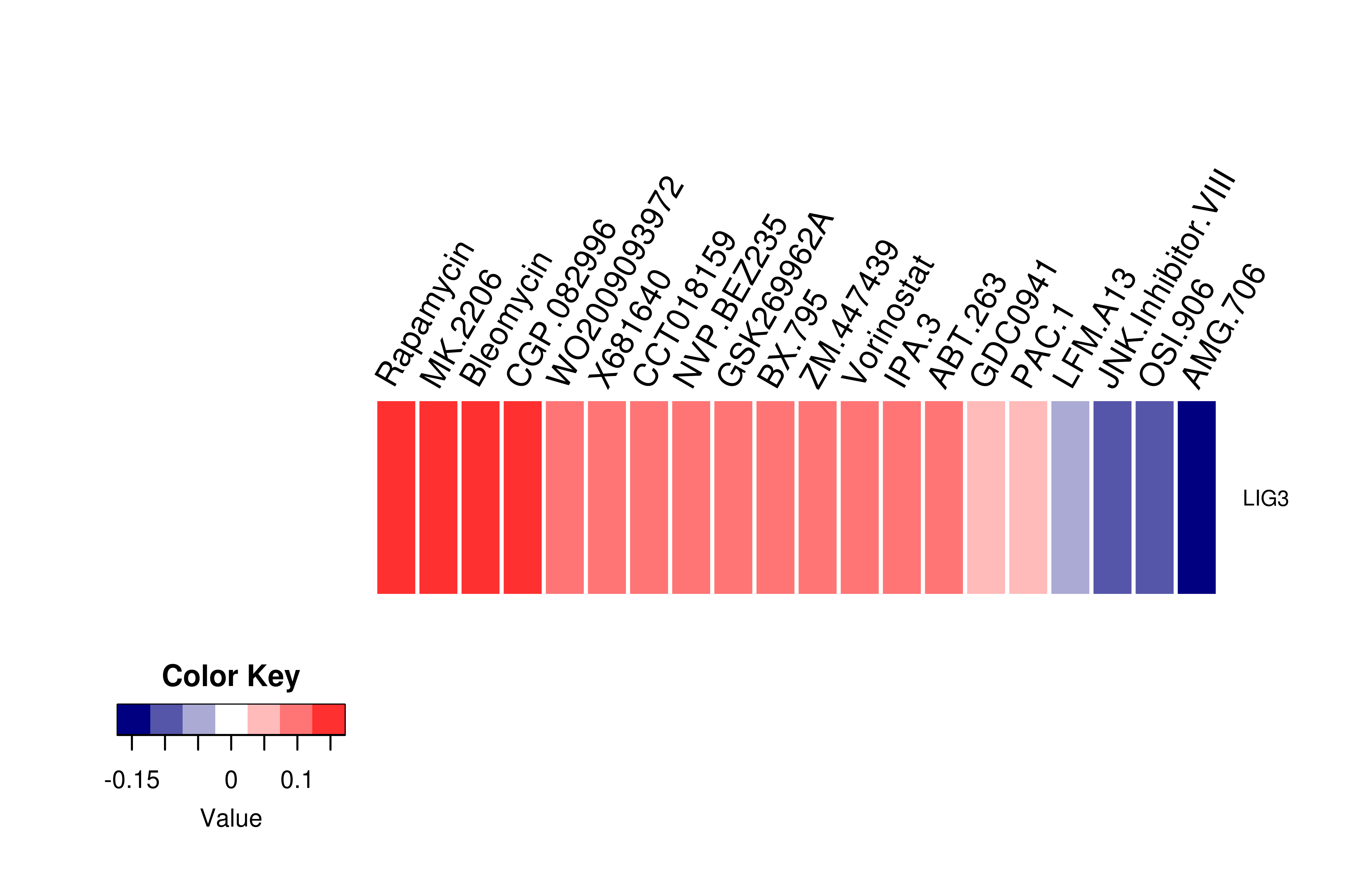 |
 Gene-centered drug-gene interaction network Gene-centered drug-gene interaction network |
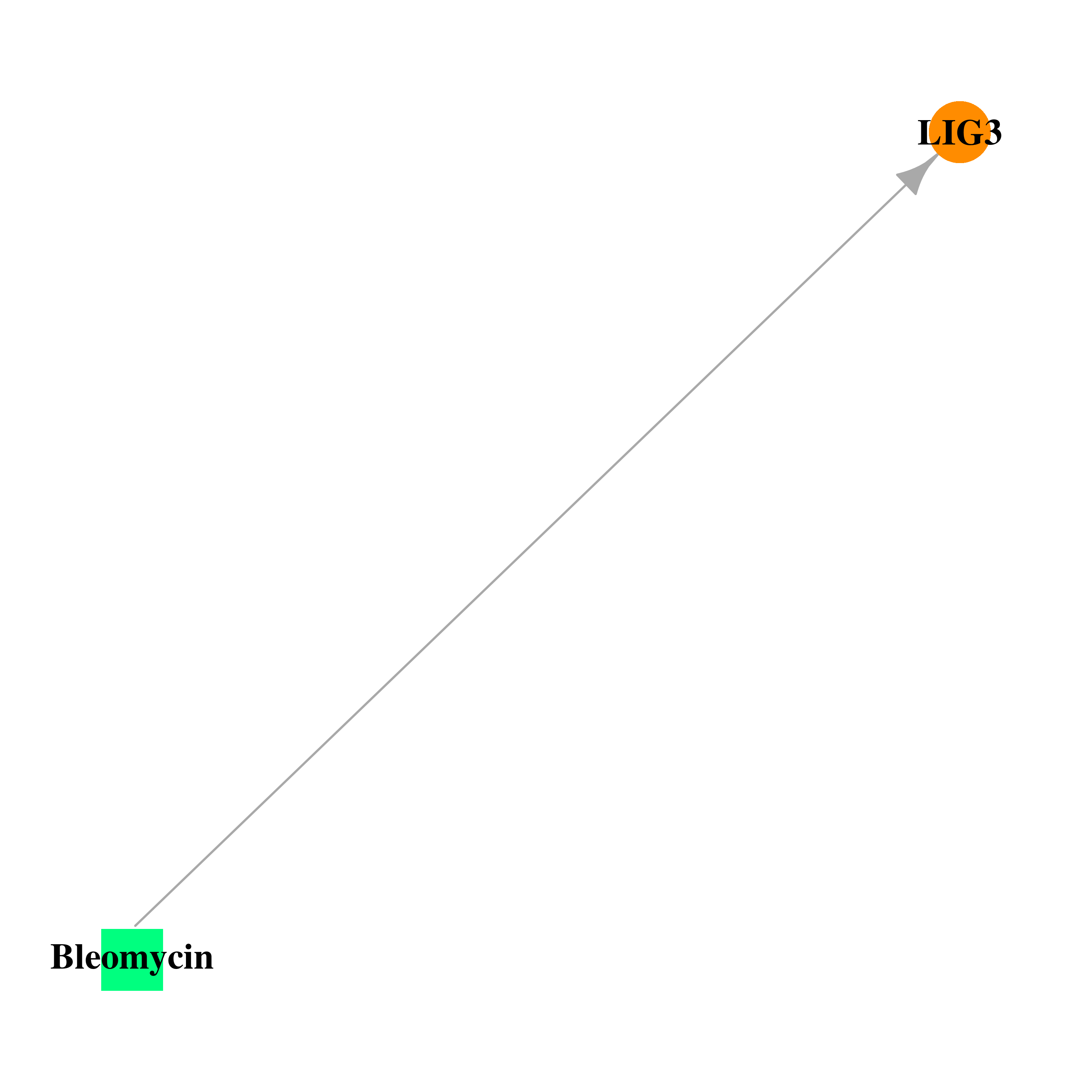 |
 Drug information targeting mutLBSgene (Approved drugs only) Drug information targeting mutLBSgene (Approved drugs only) |
| Drug status | DrugBank ID | Name | Type | Drug structure |
| Approved | DB00290 | Bleomycin | Small molecule | 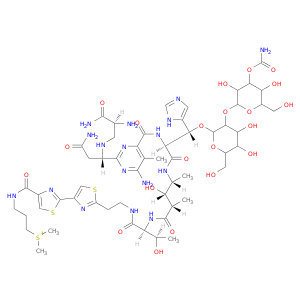 |
 Gene-centered ligand-gene interaction network Gene-centered ligand-gene interaction network |
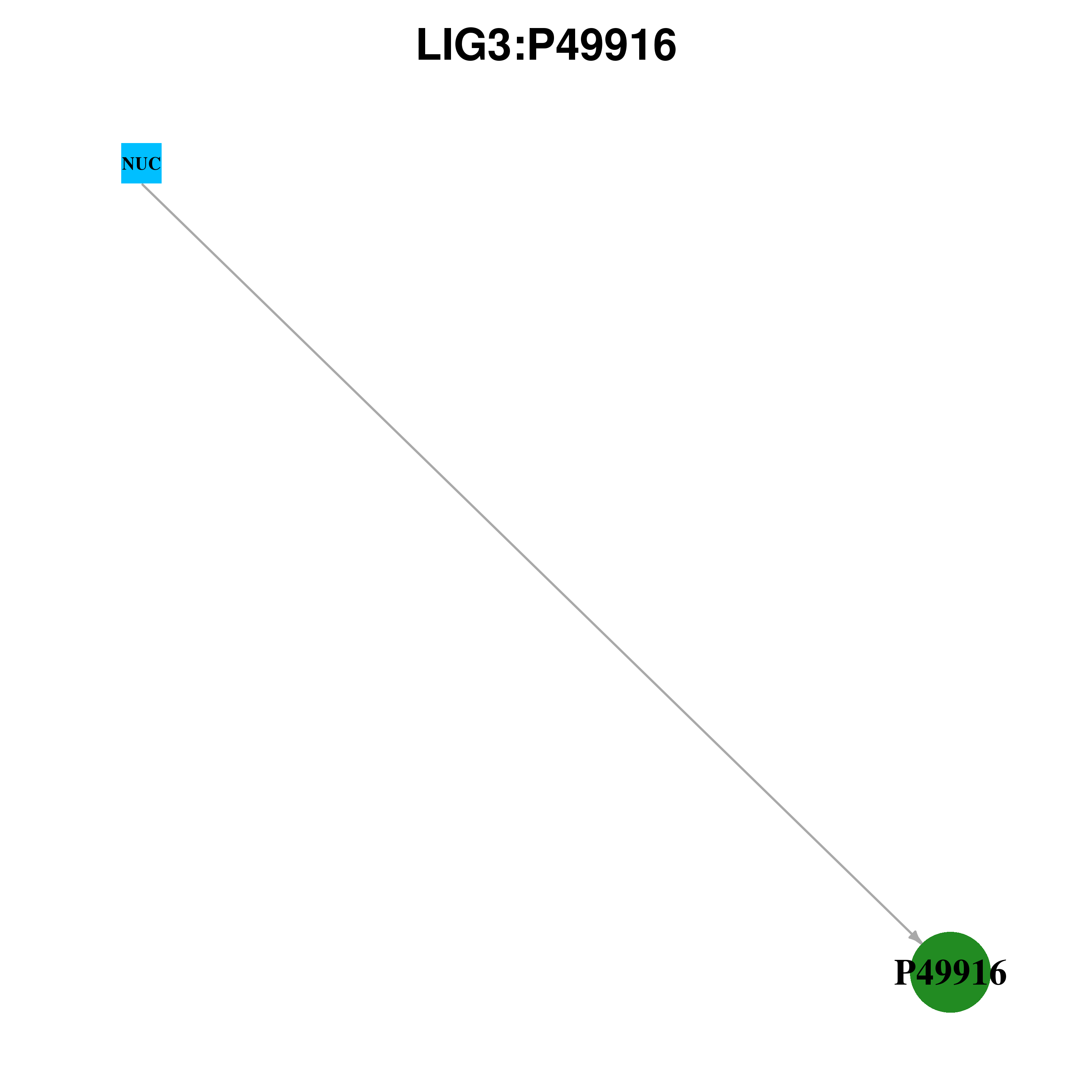 |
 Ligands binding to mutated ligand binding site of LIG3 go to BioLip Ligands binding to mutated ligand binding site of LIG3 go to BioLip |
| Ligand ID | Ligand short name | Ligand long name | PDB ID | PDB name | mutLBS |
| Top |
| Conservation information for LBS of LIG3 |
 Multiple alignments for P49916 in multiple species Multiple alignments for P49916 in multiple species |
| LBS | AA sequence | # species | Species |
 |
Copyright © 2016-Present - The University of Texas Health Science Center at Houston |
